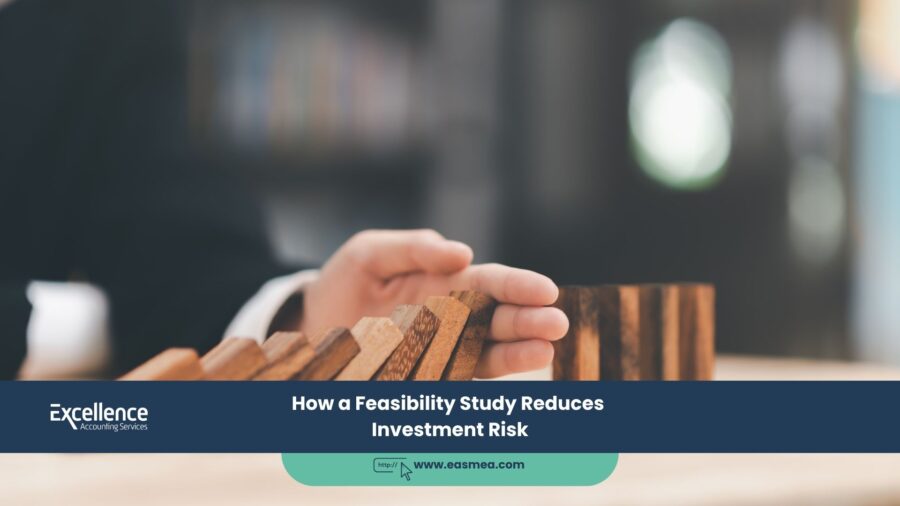How a Feasibility Study Reduces Investment Risk
Every investment, from launching a startup to funding a large-scale industrial project, carries an element of risk. It is the fundamental trade-off of capitalism: the potential for reward is intrinsically linked to the potential for loss. While risk can never be eliminated entirely, successful investors and entrepreneurs are not gamblers; they are calculated risk-takers. Their secret is a disciplined process of identifying, analyzing, and mitigating risk before significant capital is ever committed. The single most powerful tool in this process is the **feasibility study**.
A feasibility study is a systematic investigation that analyzes the viability of a proposed project or business venture. It moves an idea from the realm of assumption to the world of data-driven analysis. It is the ultimate “look before you leap” exercise, designed to answer one critical question: “Is this a viable investment?” By rigorously testing a project against market, financial, technical, and operational realities, a feasibility study acts as the primary defense against poor investment decisions.
This guide will explore exactly how a professionally conducted feasibility study serves as a critical risk mitigation tool. We will break down how each component of the study directly addresses a different category of investment risk, helping to protect capital and increase the probability of success.
Key Takeaways
- Feasibility Studies Confront Assumptions: The primary function of a feasibility study is to replace optimistic assumptions with objective data, thereby reducing the biggest risk of all: the unknown.
- Market Feasibility Mitigates Commercial Risk: It answers whether a market for the product actually exists, preventing investment in ideas with no paying customers.
- Financial Feasibility Mitigates Financial Risk: It projects costs, revenues, and profitability, preventing investment in ventures that are not financially sustainable.
- Technical Feasibility Mitigates Execution Risk: It assesses whether the project can actually be built or implemented with available technology and resources.
- The “No-Go” Decision is a Success: The most valuable outcome of a feasibility study can be the decision *not* to invest, saving capital from being wasted on a flawed venture. A professional feasibility study provides this crucial, unbiased verdict.
Deconstructing Risk: How a Feasibility Study Provides Answers
Investment risk isn’t a single entity. It’s a collection of different potential failure points. A comprehensive feasibility study dissects a project and stress-tests it against each of these risk categories.
1. Mitigating Market Risk: “Will Anyone Buy It?”
This is the most fundamental risk for any new venture. A brilliant product that nobody wants is a commercial failure. The market feasibility component tackles this head-on.
- Demand Validation: It goes beyond the founder’s belief to conduct surveys, focus groups, and market research to determine if there is genuine customer demand for the proposed product or service at a specific price point.
- Competitive Analysis: It identifies all direct and indirect competitors. This prevents underestimating the competition and helps assess whether the new venture has a sustainable Unique Selling Proposition (USP).
- Market Sizing: It provides a realistic assessment of the Total Addressable Market (TAM) and the Serviceable Obtainable Market (SOM), preventing an overestimation of the potential revenue pool.
Risk Reduced: By confirming market demand and a viable competitive position, the study significantly reduces the risk of commercial failure and wasted marketing spend.
2. Mitigating Financial Risk: “Can It Make Money?”
A great idea with a hungry market can still fail if the financial model is unsustainable. The financial feasibility analysis is a sober assessment of the venture’s economic viability.
- Detailed Cost Analysis: It meticulously projects all startup costs (capital expenditure) and ongoing operational costs. This prevents the common startup killer: running out of cash due to underestimated expenses.
- Revenue and Profitability Projections: It builds a data-driven forecast of revenues, leading to projections for key metrics like Gross Margin, Net Profit, Break-Even Point, and Return on Investment (ROI).
- Funding Requirements: It determines the exact amount of capital required to launch the business and sustain it until it becomes cash-flow positive, preventing undercapitalization.
Risk Reduced: It prevents investment in projects with no realistic path to profitability and ensures the venture is adequately funded from the start. This analysis is a cornerstone of any business consultancy engagement.
3. Mitigating Technical & Operational Risk: “Can We Actually Do It?”
An idea might look great on paper, but can it be executed in the real world? This section of the study assesses the practicalities of implementation.
- Technical Assessment: It evaluates the proposed technology, materials, and processes. Is the technology proven? Are the required raw materials readily available? This is crucial for manufacturing and tech startups.
- Resource Planning: It assesses the availability of necessary resources, including skilled labor, management expertise, and physical location.
- Regulatory and Legal Compliance: It identifies all necessary licenses, permits, and regulatory hurdles (like zoning laws or environmental regulations), preventing costly delays and fines down the line.
Risk Reduced: It ensures the project is practically achievable and legally compliant, preventing investment in a venture that is operationally or technically impossible to execute.
Turning Risk into Confidence with Excellence Accounting Services (EAS)
At Excellence Accounting Services (EAS), we specialize in transforming uncertainty into data-driven confidence. Our feasibility studies are designed not just to analyze a project, but to provide a clear, actionable recommendation that forms the basis of a sound investment decision.
- Comprehensive Feasibility Studies: We conduct in-depth, multi-faceted feasibility studies that cover all angles—market, financial, technical, and operational—to give you a 360-degree view of the risks and opportunities.
- Expert Financial Modeling: The heart of our service is robust financial analysis. Our CFO services team builds detailed financial models that stand up to the scrutiny of investors and banks.
- Objective, Independent Analysis: As a third party, we provide an unbiased assessment, free from the emotional attachment that founders often have, ensuring the final recommendation is based on facts, not hopes.
- Full-Cycle Advisory: If the study results in a “Go” decision, we can assist with the next steps, including developing an investor-ready business plan and guiding you through the company formation process.
Frequently Asked Questions (FAQs)
A risk assessment is often a component *within* a feasibility study. A risk assessment identifies potential negative events (risks), while a feasibility study is a broader investigation into whether the entire venture is viable, which includes assessing those risks and many other factors like market demand and profitability.
No. A positive feasibility study indicates that a project has a high *potential* for success if executed correctly. It confirms the fundamental assumptions are sound. However, the ultimate success still depends on the quality of execution, management competence, and external factors that can change over time.
For maximum objectivity, a feasibility study should be conducted by an independent third-party consulting firm. Founders and internal teams are often too close to the project and can suffer from confirmation bias. An external expert provides a crucial, unbiased perspective.
Banks and investors are inherently risk-averse. A professional feasibility study demonstrates that you have done your homework, understand the risks involved, and have a data-driven basis for your project. It gives them the confidence that their capital is being invested in a well-vetted opportunity, significantly increasing your chances of securing funding.
While it varies, two of the most common “fatal flaws” uncovered are an overestimated market size (Market Risk) and underestimated costs (Financial Risk). Many ideas fail when the realistic revenue potential is shown to be insufficient to cover the true costs of operation.
No. Existing businesses should conduct a feasibility study before making any significant investment, such as launching a major new product line, expanding into a new country, or building a new factory. The principles of risk reduction are the same.
A feasibility study assesses a *proposed* project or idea that does not yet exist. Due diligence is an investigation into an *existing* business or asset, typically as part of an M&A transaction. A feasibility study asks “Should we build it?” while due diligence asks “Should we buy it?”.
This is a positive outcome. The study has done its job. Your options are to: 1) Abandon the project, saving your capital. 2) Pivot the business model to address the identified risks. 3) Develop specific mitigation strategies for the risks and incorporate them into your business plan.
It saves money by preventing you from investing in a non-viable project. The cost of a feasibility study is a small fraction of the potential loss from a failed business venture. It is an investment in loss prevention.
While all projections are important, the **cash flow forecast** is arguably the most critical. It shows how much money is needed and when, and it determines if and when the business can sustain itself without external funding. Running out of cash is a primary reason for business failure.
Conclusion: The Ultimate Investment Insurance
In the high-stakes environment of business investment, proceeding on gut feeling alone is a luxury no one can afford. A feasibility study is the most effective form of insurance against preventable failure. It is a disciplined process that systematically replaces uncertainty with knowledge, assumption with data, and hope with a calculated strategy. By investing in a thorough feasibility study, you are not delaying your project; you are ensuring it is built on the most solid and secure foundation possible.
Invest with Insight, Not in the Dark.
Partner with Excellence Accounting Services to conduct an objective, data-driven feasibility study that gives you the confidence to invest wisely.




